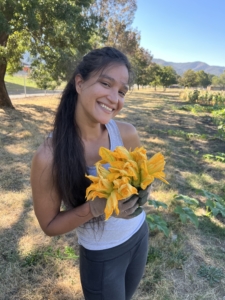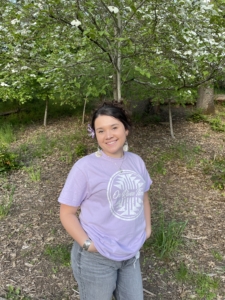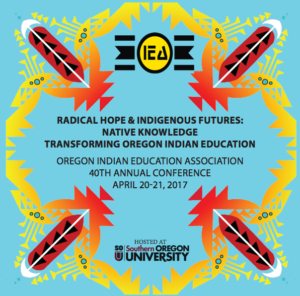SOU programs collaborate to create fellowship opportunity
(Ashland, Ore.) — Southern Oregon University’s Native American Studies (NAS) program and the SOU Laboratory of Anthropology (SOULA) have created a competitive fellowship that promotes collaboration between the two programs and recognizes the research and learning that spans both.
This year’s inaugural fellowship – which is funded by SOULA – was awarded to SOU undergraduates Kayla Dumore and Charlie Zimmermann, and will support their work with the Shasta Takelma Learning Garden project. The fellowship covers 40 hours per term of a paid internship, which can be shared between two students – as is the case for this year’s inaugural round.
The Learning Garden project aims to turn the space around SOU’s Science Building into a biodiverse and culturally rich learning space, dedicated to celebrating the historical and modern presence of the lands’ original Indigenous occupants and caretakers.
Dumore and Zimmerman are using the fellowship to uncover the historical and archeological stories that lie within the space. The fellows will consolidate the stories and publicly present them prior the eventual construction of the garden.
“I am excited for this fellowship because I get the opportunity to broaden my academic horizons by working with anthropology, and because I get to be a part of a very special project with some great people,” Charlie Zimmerman says.
Charlie is a junior studying history and political science, with a minor in Native American Studies and research interests that include the history of Oregon and westward expansion. Charlie is pursuing a career in public history, copy editing, technical writing or historical society work.
Kayla Dumore is an enrolled Klamath Tribal member, with ties to the Klamath and Modoc peoples. She is working toward a major in Sociology and Anthropology, with a certificate in Native American Studies, and plans to graduate June of 2024. Kayla plans to have a career in research, with a focus on Tribal sovereignty, cross-cultural interactions and the Indigenous history of Oregon. Kayla always keeps her community close at heart in all of the work she does, and is passionate about honoring those of seven generations into the future.
“I am deeply honored to be working on this Indigenous-led project,” Kayla says. “I am passionate about advocating for the inherent sovereignty of Native American peoples and the Indigenization of spaces within higher education. This project does both in a collaborative and meaningful way. I am beyond excited to be working with fellow students, alumni and tribal partners.”
The Native American Studies Program at SOU is an interdisciplinary field that blends social science with humanities. Though Indigenous peoples have always been engaged in theoretical and conceptual activities, the physical presence of NAS as a distinct discipline in academia is an outgrowth of American Indian activism of the 1960s and 1970s.
NAS is a problem-solving, Native American-centered and applied field, which seeks to examine experiences that unify Indigenous peoples in ways that work in service to Native American communities’ contemporary challenges and aspirations. All students are welcome.
The SOU Laboratory of Anthropology connects culture, history and place in a meaningful way. The program conducts grant- and contract-funded research that includes archaeological surveying, excavation and analysis; GIS mapping; and oral history and ethnohistoric research. It serves the interests of the university and community, selecting projects in partnership with private, local, state, federal and Tribal organizations in ways that meet collaborators’ needs and provide data for expanded research and public education.
Students from a wide range of disciplines benefit from SOULA’s hands-on experiences in fieldwork, laboratory analysis, conference presentation, writing and career networking.
-SOU-



 The NAS program will use the grant from Banyan to hire SOU alumna T Tschantre, who is of Tewa descent, to support participation in growth of Dragonfly’s Garden and to tend the plot with student intern Alanis Baldy, a citizen of the Hoopa Valley Tribe.
The NAS program will use the grant from Banyan to hire SOU alumna T Tschantre, who is of Tewa descent, to support participation in growth of Dragonfly’s Garden and to tend the plot with student intern Alanis Baldy, a citizen of the Hoopa Valley Tribe. Baldy and other NAS students were inspired by the success of Rose’s three sisters garden, and mobilized to use the technique on a garden plot – which would become known as Dragonfly’s Garden – in the SOU Community Garden. The community garden is a student-run organic cooperative at the corner of South Mountain Avenue and Henry Street.
Baldy and other NAS students were inspired by the success of Rose’s three sisters garden, and mobilized to use the technique on a garden plot – which would become known as Dragonfly’s Garden – in the SOU Community Garden. The community garden is a student-run organic cooperative at the corner of South Mountain Avenue and Henry Street.


 The conference, “Radical Hope and Indigenous Futures: Native Knowledge Transforming Oregon Indian Education,” is sponsored by SOU’s Native American Studies and affiliate programs. Registration for the full, two-day conference is $120 for the general public and $75 for students and elders, but SOU students will be admitted free to most of the event’s various presentations. Admission rates for portions of the conference are available on the OIEA website.
The conference, “Radical Hope and Indigenous Futures: Native Knowledge Transforming Oregon Indian Education,” is sponsored by SOU’s Native American Studies and affiliate programs. Registration for the full, two-day conference is $120 for the general public and $75 for students and elders, but SOU students will be admitted free to most of the event’s various presentations. Admission rates for portions of the conference are available on the OIEA website.